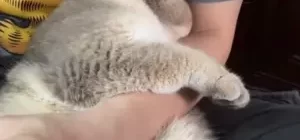The act of neutering a male cat is a prevalent procedure that involves removing their reproductive organs, leaving them incapable of reproducing. Although there are several advantages to neutering such as less aggression and lower chances of specific illnesses, lots of cat owners want to know how the behavior of their pet may differ after the surgery. We’ll explore the typical male cat behavior after neutering and offer tips for ensuring your furry friend continues to lead a happy and healthy life.
Territorial Behavior in Male Cats
When it comes to male cats, territorial behavior is a very common problem that many pet owners face. However, the good news is that neutering your male cat can drastically reduce this behavior.
When a male cat is unneutered, he is more likely to become aggressive towards other cats and humans in his territory. This can result in fights with other cats and can even lead to injuries. However, once a male cat is neutered, this behavior is significantly reduced.
Pet owners who have neutered their male cats have reported a marked reduction in territorial behavior. Their cats were no longer aggressive towards humans or other cats in their home. Instead, they became more docile and affectionate.
In addition, neutered male cats were less likely to roam in search of a mate. This means they were less likely to get lost, get into fights with other cats, or get hit by cars. Neutered cats were also less likely to spray or mark their territory with urine, making them better house pets.
Roaming Habits of Neutered Cats
Neutering can have a huge impact on the roaming habits of male cats. Intact males typically have much larger territories and wander over long distances in search of a mate. However, after neutering, cats tend to stay closer to home and are more content with their surroundings. About 90% of neutered cats decrease their roaming habits significantly, according to recent studies.
Reduced roaming can lead to a range of benefits for both cats and their owners. Firstly, cats are less likely to become lost or injured when they stay closer to home. Additionally, roaming cats can create problems for neighbors, such as territorial disputes and damage to gardens. By reducing roaming, neutered cats can create a more peaceful neighborhood for everyone.
Moreover, neutered cats are less likely to get into fights with other cats, which can lead to injury or infection with diseases like feline immunodeficiency virus (FIV) or feline leukemia virus (FeLV). Reduced fighting can also improve the overall health and wellbeing of cats, as fighting and abscess development are common issues in un-neutered males.
However, it’s essential to note that recently neutered cats may still be drawn to the outside world due to their previous habits. Therefore, owners should take care to adjust their cat’s environment and provide plenty of stimulation inside the home to keep them content and happy. Toys, scratching posts, and ample playtime can all help keep a neutered cat’s mind busy.
Side Effects of Neutering Male Cats
As previously mentioned in the blog, neutering your male cat has many benefits such as reduced territorial behavior, roaming habits, and fighting. However, it’s important to note that there are also some possible side effects that your cat may experience after the procedure.
One common side effect is a decrease in appetite for a short period of time. It’s completely normal for your cat to not be interested in food immediately after being neutered. This is due to the anesthesia and surgery itself. However, you should monitor your cat’s eating habits and make sure they start eating normally within a few days. If not, it’s best to consult with your veterinarian.
Another possible side effect is lethargy or drowsiness. Your cat may seem more tired than usual and may sleep more often. This is also normal and should subside within a few days. It’s important to give your cat a quiet, warm and comfortable place to recover for the first 24 hours after the procedure.
One myth that has been debunked is that neutering your male cat will cause it to gain weight. While neutering can decrease the cat’s metabolic rate, it’s not a definite cause for weight gain. Proper diet and exercise are still important for maintaining a healthy weight for your cat.
Overall, while there may be some temporary side effects after neutering your male cat, they are minimal and the benefits far outweigh the risks. Neutering your cat not only prevents unwanted litters but also improves their overall health and behavior. It’s a simple procedure that can greatly improve your feline companion’s quality of life.
Sexual Behavior of Neutered Male Cats
After neutering, male cats experience a decrease in their sexual behavior. However, this does not happen overnight, and some males may still show interest in females for months or even years after their surgery. This is due to the lingering presence of testosterone in their system.
Fortunately, neutering is very effective in curtailing most male-typical behaviors. This includes roaming in search of mates, aggression towards other males, and spraying to mark their territory. These behaviors can cause a lot of problems for both cats and their owners, and neutering can help alleviate them.
While it may take some time for a neutered male cat’s libido to decrease, the benefits of neutering are numerous. Neutered males are less likely to fight with other cats, reducing their risk of abscesses, and they tend to have smaller territories, which means less roaming and less overall stress.
Changes in Personality after Neutering
Neutering your male cat can have a significant impact on his behavior and temperament, despite what some may believe. While the procedure aims to reduce hormones and limit behaviors associated with them, it does not completely change a cat’s personality. That being said, neutering can have a positive impact on a male cat’s behavior and reduce certain negative traits.
One of the most significant changes in a male cat’s behavior after neutering is a decrease in their desire to roam and look for fights. This behavior is often a result of their mating instincts, which are significantly reduced after neutering. Studies have shown that more than 90% of neutered male cats will reduce this tendency to fight, making them calmer and more affectionate companions.
Additionally, neutering can lead to a decrease in territorial behavior. Male cats often mark their territory by spraying urine or engaging in aggressive behavior towards other cats. This tendency is also linked to their mating instincts and can be reduced after neutering. While it may not completely eliminate territorial behavior in all cats, it can significantly reduce it.
Neutering can also have side effects such as lack of appetite, nausea, lethargy, and vomiting. These side effects are typically temporary and should not cause alarm. However, if they persist, a veterinarian should be consulted.
While neutering can have positive effects on a male cat’s behavior and temperament, expecting a complete personality change is unrealistic. Each cat has its unique personality, which is affected by genetic and environmental factors. Therefore, neutering should be viewed as a supplement to good cat care, rather than a solution to behavior problems.
Reduced Roaming and Fighting in Neutered Males
Neutering is a simple surgical procedure that offers several benefits to male cats. The reduced territorial behavior, fighting, and roaming in neutered males also makes it safer for them to be outside.
After neutering, male cats tend to be more relaxed and content, and they no longer feel the need to mark their territory or fight over a mate. This reduces the risks associated with roaming, such as getting hit by a car or getting into fights with other cats.
If you are a cat owner, you might be concerned about how your cat might change after neutering. However, rest assured that, other than the reduced male behaviors, your cat is likely to remain the same lovable pet they were before.
It is essential to note that some cats may continue to exhibit male sexual behavior after neutering, but it is much less intense and manageable. After being neutered, adult male cats who did not display affiliative behavior previously have been observed displaying it. Occasionally, these neutered cats may undergo side effects like exhaustion, loss of hunger, feeling sick or throwing up. However, these effects are only for a short duration and should disappear within a few days.






